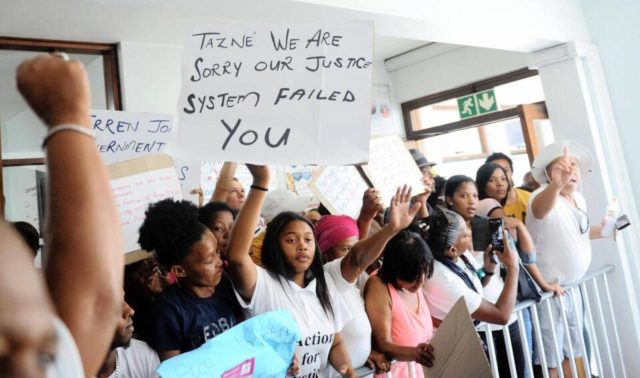Two horrific cases of child murder have again brought the issue of parole for sexual offenders and notifiability to the fore.
Two horrific cases of child murder have again brought the issue of parole for sexual offenders and notifiability to the fore.
The parents of 8-year-old Tazne van Wyk will never come to terms with the death of their daughter – murdered and dumped in a drain. The alleged killer, Moeyhdien Pangkaker, 54, lived next door to the Elsies River family. He had been released from prison on parole after committing a sex offence and had disappeared from the police radar.
Last month the body of 12-year-old Michaela Williams was found in bushes in 9th Avenue in Schaapkraal. The suspected killer was previously convicted of rape and released from prison a year ago. She disappeared on January 7 while playing in front of her home in Pelican Park. Like Tazne, the man charged with her murder was a neighbour.
South Africa has a National Register for Sex Offenders, which contains the details of people convicted of sexual offences against children or mentally disabled people. Those listed are prohibited from working with children or mentally disabled, and from adopting children or acting as foster parents. The public is prohibited from seeing it.
The overarching question was whether communities should be made aware of the presence of sexual predators in their area and the possibilities that these offenders could offend again.
In the latest crime figures, 52420 sexual offences were reported in the 2018/2019 financial year. Of these, 7680 involved victims aged 19 or younger.
Last year the government said it was reviewing laws to ensure parole is not granted to people convicted of sexual offences and to implement stricter bail conditions for alleged sexual offenders. It is understood the process is ongoing.
The register was created by Chapter6 of the Criminal Law (Sexual Offences and Related Matters) Amendment Act, 2007 and came into being on June 30, 2009 under the administration of the department of justice and constitutional development. It contains details of offenders convicted before the creation of the register collected from existing records, while details of offenders convicted since the creation of the register are added by the convicting court.
Nelisa Ngqulana, an activist against gender violence believes that the situation is unfair. She says it’s important to make the register public “because it will give people a sense of power”.
“I can check who’s around my children and have a sense of control to a certain degree”.
Former magistrate and member of the Joburg bar, advocate Deon Pool, says putting the register in the public domain would be a “recipe for disaster” and encourage witch-hunts, which is not the purpose of the sexual offences register.
“I do not think any good can come from it being made open to the public at the click of a button,” he said.
“We need to come up with a better solution to extend the scope of people who accessed it.”
Sheena Swemmer, head of the Gender Programme at the Centre for Applied Legal Studies believed the issue of a public register of sex offenders would need to be taken further.
“Making it public would be releasing something that has 50 names on it. It hasn’t been properly updated and it only deals with cases involving children and mentally ill people,” said Swemmer.
Weekend Argus








